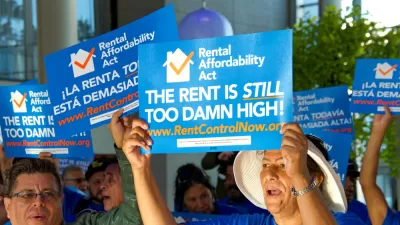As California voters consider a ballot initiative that would greatly expand rent control around the state, researchers are working to inform the populace about rent control.

California voters will consider Proposition 10 in November, which, if passed, would repeal the Costa-Hawkins Rental Housing Act of 1995.
Put simply, Proposition 10 would enable a large expansion of rent control throughout the state of California.
Given the incredibly high stakes of such a consequential policy change, the debate over the potential effects of rent control has been much more public in recent months. Enter into the fray a new study by researchers at the University of Southern California, Manuel Pastor, Vanessa Carter, and Maya Abood.
The study, titled "Rent Matters: What are the Impacts of Rent Stabilization Measures?" finds that rent control has "far fewer negative impacts than is generally thought." In fact, rent control "is a useful tool in a crisis."
According to the study's abstract:
Surveying existing research on rent regulations, we find that moderate rent controls do not constrain new housing, do promote tenant stability, may lead to condo conversion (which can be limited with other tools), and may deter displacement from gentrification.
Across town, at the University of California, Los Angeles, Alisa Belinkoff Katz has taken a different approach to presenting new information on the subject of rent control by writing a history of the policy in Los Angeles. "The study is the first major publication of the UCLA Luskin Center for History and Policy, which was founded in 2017 with a mission to bring historical perspective to contemporary policy issues," according to a website promoting the new paper.
Exemplifying yet another approach, probably more familiar to academic audiences, is a study from researchers at Stanford University in January 2018, which found a mixed bag of benefits and drawbacks, depending on whether you're a tenant, a landlord, or looking for a new apartment in a crowded market.
FULL STORY: Rent Matters: What are the Impacts of Rent Stabilization Measures?

Manufactured Crisis: Losing the Nation’s Largest Source of Unsubsidized Affordable Housing
Manufactured housing communities have long been an affordable housing option for millions of people living in the U.S., but that affordability is disappearing rapidly. How did we get here?

Americans May Be Stuck — But Why?
Americans are moving a lot less than they once did, and that is a problem. While Yoni Applebaum, in his highly-publicized article Stuck, gets the reasons badly wrong, it's still important to ask: why are we moving so much less than before?

Research Shows More Roads = More Driving
A national study shows, once again, that increasing road supply induces additional vehicle travel, particularly over the long run.

Which US Rail Agencies Are Buying Zero-Emissions Trains?
U.S. rail agencies are slowly making the shift to zero-emissions trains, which can travel longer distances without refueling and reduce air pollution.

San Diego School District Approves Affordable Housing Plan
The district plans to build workforce housing for 10 percent of its employees in the next decade and explore other ways to contribute to housing development.

Lawsuit Aims to Stop NYC’s ‘City of Yes’ Zoning Reforms
A lawsuit brought by local lawmakers and community groups claims the plan failed to conduct a comprehensive environmental review.
Urban Design for Planners 1: Software Tools
This six-course series explores essential urban design concepts using open source software and equips planners with the tools they need to participate fully in the urban design process.
Planning for Universal Design
Learn the tools for implementing Universal Design in planning regulations.
City of Moreno Valley
Institute for Housing and Urban Development Studies (IHS)
City of Grandview
Harvard GSD Executive Education
NYU Wagner Graduate School of Public Service
City of Cambridge, Maryland
Newport County Development Council: Connect Greater Newport





























